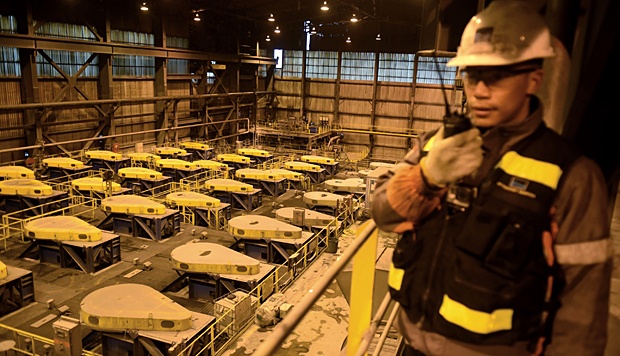Special Staff of ESDM Minister: Three Points not Open to Negotiation with Freeport
 Special Staff of the Minister of Energy and Mineral Resources Hadi M. Djuraid clarified the news, comments, opinions, and analysis, which essentially questioned commitment and consistency of the Government/the Ministry of Energy and Mineral Resources (ESDM) in handling the issue of PT Freeport Indonesia.
Special Staff of the Minister of Energy and Mineral Resources Hadi M. Djuraid clarified the news, comments, opinions, and analysis, which essentially questioned commitment and consistency of the Government/the Ministry of Energy and Mineral Resources (ESDM) in handling the issue of PT Freeport Indonesia.
In negotiating with PT. Freeport Indonesia, Hadi M. Djuraid through a press release on Thursday (6/4) afternoon stated that the ESDM Ministry sticks to and is guided by the Law Number 4 of 2009 on mineral and coal mining and the Government Regulation Number 1 of 2017.
On that basis, Hadi continued, the position and stance of the ESDM Ministry is using the negotiations to ensure that Freeport Indonesia would change its Contract of Work (CoW) with a Special Mining Business License (IUPK) of Production Operations, build a smelter, and divest shares up to 51 percent. “Such three points are not to be bargained for nor negotiated. What can be negotiated is how to implement them,” Hadi said.
According to Hadi, both parties (the ESDM Ministry and Freeport Indonesia) have agreed to divide the negotiations in two phases, namely short-term and long-term negotiations. The negotiation period is six months starting from February 2017.
The focus of short-term negotiation, according to Hadi, is on the conversion of the CoW into an IUPK. “The conversion of the CoW into an IUPK becomes a priority because it will be the basis for the next negotiation. Moreover, the IUPK makes Freeport Indonesia possible to operate normally in Timika, Papua, so that prolonged economic and social excesses do not occur in Timika in particular and Papua in general,” Hadi explained.
After four weeks of negotiations, Hadi explained, Freeport agreed to accept IUPK. However, Freeport asked for an extension of negotiation period from six months to eight months as from February. “The ESDM Ministry agreed with the request, so the remaining time starting from this April is six months,” Hadi said, adding that six months are the remaining time for negotiation on long-term solution, covering the focus on investment stability demanded by Freeport as a condition of receiving IUPK, continuity of Freeport operations, and the share divestment of 51 percent.
Under the Government Regulation Number 1 of 2017, the IUPK holder may file a recommendation for exports of concentrate for six months, on condition commitment to building smelter in five years, paying export tax assigned by the Minister of Finance, and divesting shares up to 51 percent. Points of divestment will be included in the long-term negotiation.
Hadi said that progress in the process of construction of the smelter will be verified by an independent verifier within six months. He emphasized that if the results of the verification show that the progress of construction of the smelter is not in accordance with the approved plan of the ESDM, the export recommendation will be revoked. “These requirements apply to all holders of IUPK without exception. This procedure has been applied by other former CoW holder who have switched to IUPK, namely PT Amman Mineral Nusa Tenggara (formerly known as Newmont),” Hadi explained.
Thus, Hadi said, it is clear that in the next six months, Freeport would operate on IUPK basis. The targets of short-term negotiation have been achieved, including the return to normalcy in operations of Freeport Indonesia in Timika so that social and economic excesses that have occurred since a ban on exports on 12 January 2017 are not widespread and prolonged.
Regarding the second stage of negotiations, according to Hadi, it will begin in the second week of April, with a solid basis of IUPK. The negotiations would involve related institutions/agencies, including the Ministry of Finance, Indonesia Investment Coordinating Board (BKPM), Ministry of Home Affairs, Provincial Government of Papua -including the Government of Timika Regency and representatives of indigenous community in Timika.
If after the next six months agreement failed on the points of the long-term negotiations, Hadi asserted, Freeport could return to its position as CoW contractor with the consequences of not being able to export concentrate. “Therefore, it is clear and obvious that the Government represented by the ESDM Ministry is consistent with its commitment to realizing the mineral downstream and strengthening national sovereignty through the ownership of 51 percent of share divestment,” Hadi concluded. (SM/ES) (MUR/YM/Naster).








